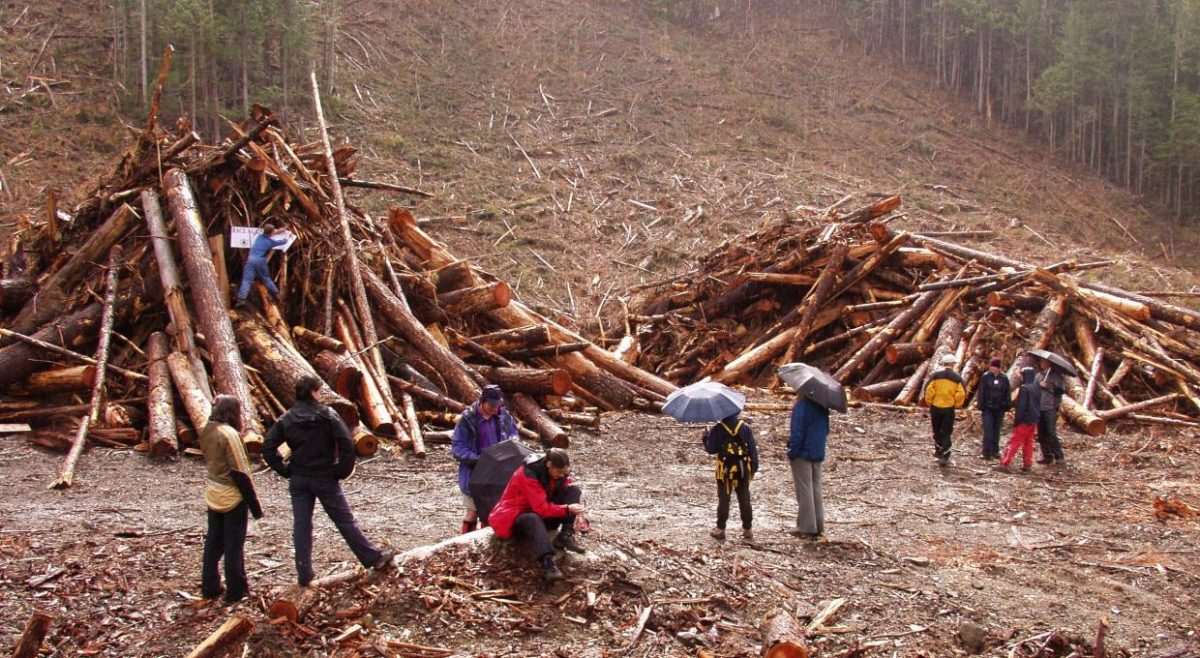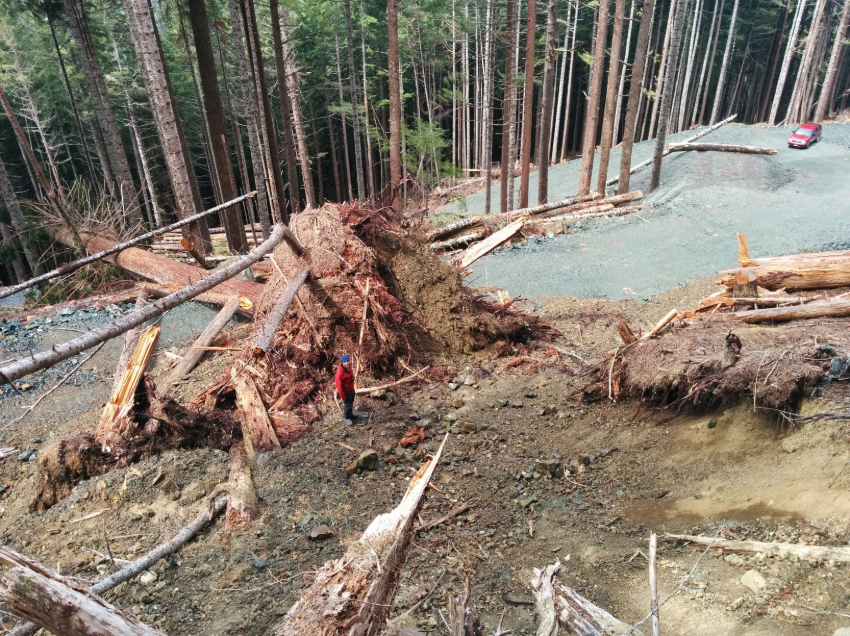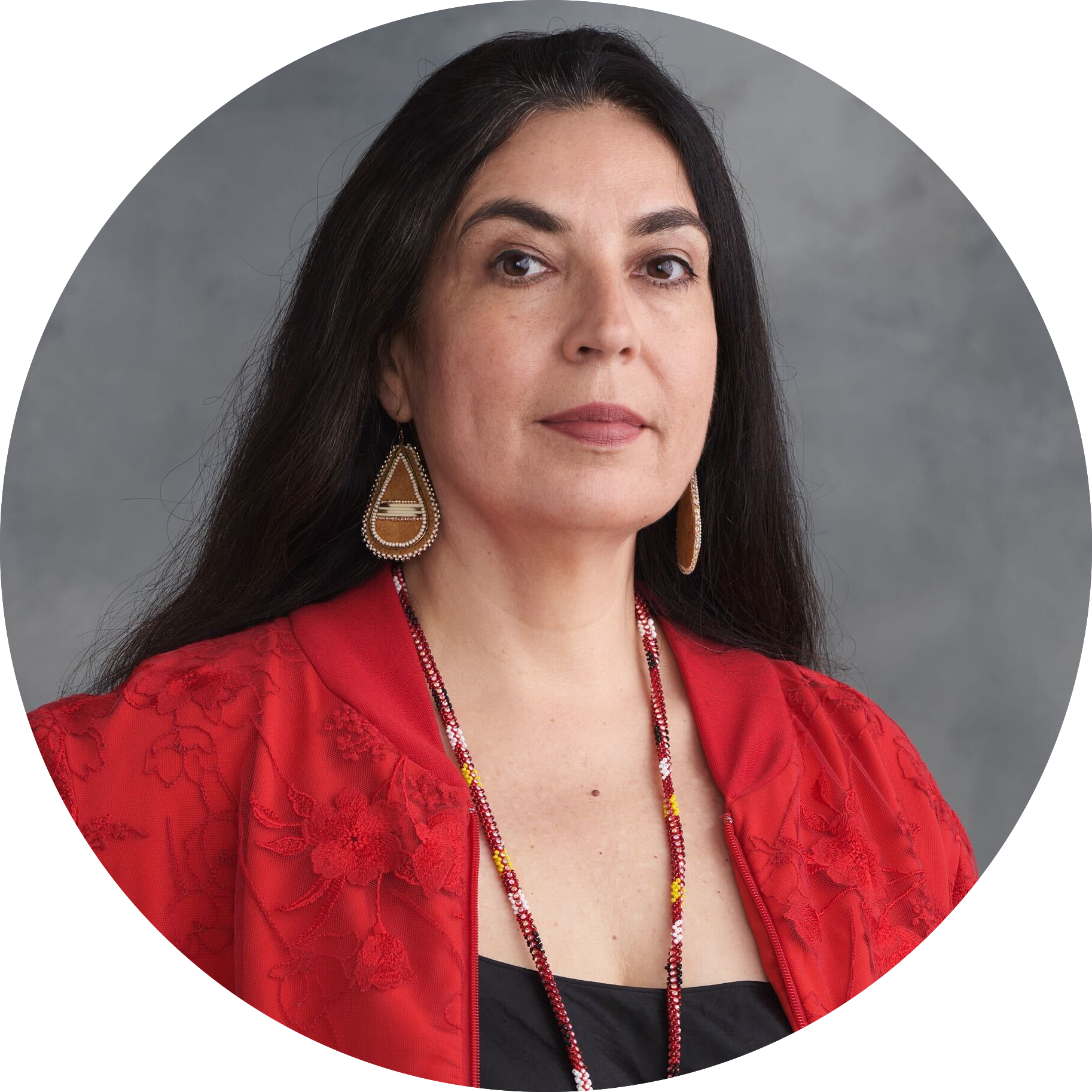
The root of the problem in northern Ontario
This story about a lawsuit involving First Nations in northern Ontario has deep roots — in...
In the Schmidt Creek watershed on northeastern Vancouver Island, just a few kilometres from globally renowned orca rubbing beaches, huge swathes of old-growth rainforest are slated for imminent clear-cutting.
Further south, in the Nahmint Valley near Port Alberni, the ninth-largest Douglas-fir tree in the country has just been cut down. And a few hundred kilometres to the east, a forest virtually surrounded by Manning and Skagit provincial parks is being clear-cut despite being within B.C.’s highest priority grizzly bear recovery zone.
Which profit-driven logging corporation is behind all of this?
None of them. This is the work of the government of British Columbia.

Slash piled at a clearcut in Manning Park, B.C. 2004. Photo: Wilderness Committee
More specifically, it’s the work of
BC Timber Sales, a government agency within the Ministry of Forests, Lands, Natural Resource Operations and Rural Development. BC Timber Sales controls around 20 per cent of the cut on crown lands, planning cut blocks and then auctioning them off to logging contractors.
In theory, public control over a sector as important as forestry is a great thing. It means public priorities, like the protection of rare old-growth forests, can be prioritized because these areas are being managed by elected officials representing the public instead of by corporations representing their shareholders.
Unfortunately, this isn’t playing out on the ground, and the minister in charge of forests, Doug Donaldson, is plundering important forests with as much disregard as any corporate CEO.
Earlier this summer, we visited Schmidt Creek, a watershed in Kwakwaka’wakw territories on northeastern Vancouver Island. The valley drains into Johnstone Strait, near the unique orca rubbing beaches in the Robson Bight Ecological Reserve. Whale experts are worried about the impacts of clear-cutting the steep, erosion-prone slopes in this sensitive ecosystem. Minister Donaldson has stated publicly that the benefits of this planned logging balance out the risks.
BC Timber Sales’ operations are further along in the Nahmint Valley in Hupačasath territory near Port Alberni, where clear-cutting of old-growth rainforests, including record-sized trees, began in May.
In the Cascade Mountains in Stó:lō and Nlaka’pamux territories, BC Timber Sales is also quickly destroying forests surrounded by Manning and Skagit provincial parks, in an area known as the “Donut Hole.” Long coveted as a potential addition to B.C.’s protected area system, this precious wildland is being picked apart with clear-cuts within slow-growing high elevation forests where logging scars will persist for centuries. This is being done despite its importance for key species that depend on it for habitat and migration.

Wilderness Committee campaigner Torrance Coste amid logging activity in Schmidt Creek. Photo: Wilderness Committee
To add insult to injury, the Caycuse Flats bridge in Manning Park has recently been rebuilt to help get logs out of the Donut Hole. Elsewhere in Manning Park and in other parks across B.C., infrastructure and facilities are in desperate need of maintenance because the government doesn’t “have the funds” for repairs and upgrades. That money can immediately be found to fix a bridge in a park to help log forest just outside of it speaks volumes about this government’s priorities.
In the past year, the Wilderness Committee, along with our allies at the Ancient Forest Alliance and Sierra Club BC, have met twice with Minister Donaldson. We’ve advocated for the protection of old-growth rainforests and a just transition to sustainable second-growth forestry that prioritizes Indigenous rights and local jobs.
Our organizations have given the minister and his staff recommendations to accomplish this in an organized, science-based way. The simplest of these is to direct BC Timber Sales to cease issuing cut blocks in old-growth forests.
No one is saying the rapid shift to second-growth logging across the province is going to be easy or without complications. But BC Timber Sales is part of Donaldson’s ministry: this is the logical place for him to start.
In its election platform, the NDP promised an “evidence-based scientific approach” to old-growth management, with the ecosystem-based management of the Great Bear Rainforest used as a model. Now that they’re in power, Premier John Horgan and Minister Donaldson are not only allowing corporations to continue liquidating rare and important forests — they’re one of the worst offenders. Their agency is leading the way to the bottom of the barrel, logging endangered species habitat, old-growth and some of our province’s top protected area candidates — all on the public’s dime.
After decades of the B.C. government ignoring the crisis in these forests, the public is eager for leaders who will show courage and tackle this problem.
It’s time for Minister Donaldson and Horgan to decide if they want to be remembered as those courageous leaders or as status-quo politicians who signed-off on the liquidation of these precious ecosystems.
Torrance Coste is Vancouver Island Campaigner for the Wilderness Committee. Follow him on Twitter @torrancecoste.
Content for Apple News or Article only Get the inside scoop on The Narwhal’s environment and climate reporting by signing up for our free newsletter. This...
Continue reading
This story about a lawsuit involving First Nations in northern Ontario has deep roots — in...

At a crucial point in their research, biologists are scrambling to find new support for...

From True Detective to The Grizzlies, the Inuk actor is known for badass roles. She's...

